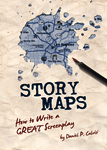Choosing a Script Service or Screenplay Consultant Part II: The Three Main Types of Script Services You Can Hire
“Those Who Teach” Choosing a Screenwriting Coach
by Daniel Calvisi, professional Story Analyst (Miramax Films, Dimension Films, Twentieth Century Fox, New Line Cinema) and author of Story Maps: How to Write a GREAT Screenplay
PART II: The three main types of screenplay coaches/consultants you can hire…
1) The Produced Screenwriter
A screenwriter who has sold scripts and had their work produced can give you great insights into the creative process and how to tailor your work for the market. Their commercial instincts, stories from the trenches, and real-world experience from the writer’s side of the business are invaluable, but I have to stress that it’s also important that they have a good deal of experience as a coach/teacher.
If they don’t have the ability to assess your skill level or find the right words and examples to guide you to make progress, then their experience is not worth much. Keep in mind that many screenwriters only know the biz from their side of the desk, which may or may not be what you need. For example, you’ll hear screenwriters bitching about coverage and how it’s the scourge of the industry. But coverage is a necessary evil and it’s here to stay, so I advise that you try to write your script with an eye toward blowing away the Reader who will be writing that coverage report.
I’ve also heard about screenwriters who try to make your script more like theirs. They are essentially guiding you to rewrite your script how THEY would rewrite it, which is not helpful, especially if they’ve never worked in your genre.
Buyer beware.
The next type of script service is…
2) The Coverage Service
Considering that I wrote an article named Don’t pay for Script Coverage, it’s safe to say that I’m not fond of coverage services! But… I think they can be helpful if you have an established relationship with a coverage service and they allow you to request a reader.
I would never recommend using a service that is anonymous.
Firstly, it seems silly to me to not know who’s reading my work or if they have any industry experience. In many cases, their name and bio is not listed because they have no industry experience. The coverage service will farm out your script notes to whoever is available, be that their most experienced Story Analyst or their least.
Many contests and coverage services do not pay their Readers. If your Reader is working for free, do you think they are a qualified professional that will give your script the extra care and attention it needs?
Now, if the founders of the coverage service are also anonymous…run like hell. I can’t believe how many film and screenwriting sites offer paid services but don’t have an ‘About Us’ page. Or if they do, there’s no names on it! I recently saw a consultation website that not only didn’t print the names of their founders, but didn’t even list the prices of their services.
If they can’t tell you specifically who they are and their credentials, avoid them.
Here’s mine…
Endorsement from Script Magazine
Many of these sites charge lowball rates, which may seem great at first but you have to ask yourself how much personal attention will you get at such prices? With prices so low there’s just no way they can read your script in detail and take the time to do a thorough, thoughtful analysis. Let’s say you’re paying $55 for coverage; the site is taking their cut and paying the Reader a percentage, I’d say at most $35. So if you’re a Reader and you’re making $35 no matter how much time you put into the job, and the client will never be in contact with you or even know your name, would you spend 4 hours or 1 hour? How about 30 minutes? If there’s no synopsis for them to write, who knows if they actually read the whole script?
Which brings us to everyone’s favorite part of the coverage report…the Synopsis and why it’s a thorn in the side of all writers.
Every writer who gets negative coverage looks for clues to confirm the Reader is, in fact, clearly insane and horrible at their job. The easiest place to find this evidence is in the Synopsis. If the Reader didn’t detail every scene, or God forbid, skipped over a scene or a major character or misspelled the villain’s name once…EUREKA! That means this was a bad Reader!
They OBVIOUSLY didn’t read your script, because in your script the villain uses a piano wire to strangle Guard #1, not a chicken wire! The Reader just skimmed the script, missing all the nuance and amazing word choice and crucial plot twists. This must be the case, because the synopsis is so thin.
But that doesn’t mean they didn’t read your script.
It probably means that the script just didn’t work for them. (In fact, we often know in the first ten pages if it’s “not working for us.”) And if they know they’re going to pass and their boss won’t bother to read it, then why bother writing a masterpiece of a synopsis?
All that means is that they were trying to get through the synopsis as fast as possible. Which makes sense, because the synopsis is the most tedious to write and THE LEAST IMPORTANT SECTION OF THE COVERAGE. Why? Because YOU know your story, you don’t need it encapsulated (unless of course you’re hoping someone else will save you the tedious task of synopsizing your own script!).
In an industry situation, the synopsis exists so the development executive can read the plot of this story without having to take the time to read the actual script. So it follows that they’re only going to bother with reading the synopsis if the coverage is positive.
But when you’re paying for coverage, there’s no movie industry employer. The Reader, in this case, is not evaluating your screenplay for Michael Deluca Productions or Valhalla or Gary Sanchez, they’re evaluating it *in general,* in essence simulating the experience of your screenplay getting coverage from the company you submitted to…and this is one of the reasons why freelance coverage is not accurate.
One of my employers as a pro Reader was Clinica Estetico, a production company owned by director Jonathan Demme and producer Edward Saxon (The Silence of the Lambs, Beloved, Ulee’s Gold). At one point, I was given a bunch of baseball-themed material because Demme was apparently a lifelong fan of the sport and was itching to do a baseball picture. Normally, reading for the producers of a serial killer thriller and a slavery drama, I would only recommend a sports movie if the writing was just plain fantastic. But in this case, they solicited this material themselves and were looking for this genre, so I gave these reads a bit more room for error. In the end, I gave a few of them a Consider even though they were just “good’ and not “great,” because the particular focus on baseball provided potential for development (what is sometimes called a Consider with Reservations, not the kind you make at Chateau Marmont).
Now, if I were reading for another company, knowing that a sports movie is normally a niche genre, then the material would need to really be gangbusters to get me to rate it a Consider.
So this is all a way of saying that maybe you don’t need coverage, but rather the insight of a proven professional.
In my humble opinion, the BEST Screenplay Coach you can hire is…
3) The Industry Veteran
This consultant comes with experience evaluating, and maybe also developing and producing, screenplays. They have primarily worked on the other side of the desk, as the people to whom you submit your script and they are tasked to read and evaluate it as a potential property for their employer. They have been the people you are trying to impress with your work so that it climbs up the ladder to the Big Cheese with the check book.
I believe these are the best people to analyze your screenplay, and I know this may come as a SHOCKER, but…I’m one of them!
No, really, please pick yourself up off the floor. I can’t do it for you, due to my policy of “tough love.”
I worked as a Senior Story Analyst for Miramax Films and Dimension Films in their heyday and a freelance Story Analyst for companies like Fox 2000, New Line Cinema and Propaganda Films. These companies produced movies like the Scream trilogy, Chicago, Spy Kids, Ulee’s Gold, Imposter, Mimic, Gangs of New York, One Fine Day, Volcano and The Game, directed by David Fincher. I didn’t work on those particular films, but I mention them to show the caliber of the teams I was working for. I was tasked with evaluating material that competed at this level.
I was given material with major talent attached, like Johnny Depp, Pierce Brosnan and Sam Raimi.
I believe that the Industry Vet is going to give you the most valuable insight; they know what the buyers are looking for, so they can coach you on how to make your script more like this top-level product.
As a former Story Analyst, I can tell you that first and foremost, they are always looking for writing talent. Everyone in Hollywood searches for a riveting page-turner of a script written in a confident, emotional and cinematic voice. So it begins and ends with CRAFT. But this is not the only thing that’s going to impress them enough to want to work with you. You’ve still got concept, genre, budget and timing to consider. It’s a complicated, trying and lengthy process to produce a spec script that’s going to blow away those tough industry professionals.
With this difficult and exhilarating journey ahead of you, I believe that the best guidance you can find comes from a combination of all of these types of consultants: The Triple Threat.
In Part Three of this magnum opus, I’ll tell you the final and BEST kind of professional to hire!
-Dan Calvisi




Leave a Reply
Want to join the discussion?Feel free to contribute!